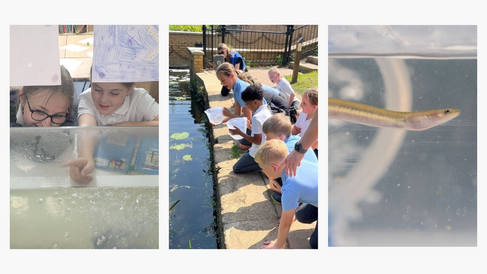Pupils from Lionel Walden Primary School with colleagues from Cambridgeshire ACRE, Environment Agency and the CLR on the day the eels were released back into the River Ouse
How hands‑on science brought ecology to life for Fenland pupils
In Spring 2025, the Centre for Landscape Regeneration supported a hands‑on outreach project with Cambridgeshire ACRE that brought living ecology into two Fenland classrooms: Lionel Walden Primary School and Alderman Payne Primary School. With support from the Environment Agency (EA), young elvers (baby European eels) were collected from the River Ouse, carefully transported to classroom tanks for observation and care, and later released at Godmanchester Mill Steps.
Along the way there were escape attempts, growth spurts, and even a class favourite—“Big Boy Barry”. Through the project, pupils experienced first-hand what it means to care for endangered species, river systems, and conservation. The ‘Eels in the Classroom’ project helped more eels to reach their adult life-stage in the Cambridgeshire Fens, contributing to their future viability.
“ They learnt a lot about eel life cycles and they learnt that, sadly, some just don’t make it. They also learnt about the importance of conservation and helping endangered animals. ”
- Class teacher
By educating the pupils about local nature recovery, projects like these help to empower communities to be active participants in their changing landscape.

Why eels?
European eels once thrived in the UK’s rivers, but their numbers have declined by over 95% since the 1980s and the species has been classified as ‘critically endangered’ by the IUCN since 2008.
Constructed weirs, tidal gates and dams all act as barriers to migration, while pollution, climate change, overfishing and habitat loss all have a negative impact on eel survival.
Specifically, in the River Ouse, the number of elvers found through the Environment Agency’s monitoring has declined every year since 2013 (2018 populations were down by 83% compared to 2013).
Release day at Godmanchester Mill Steps
After several weeks, classes travelled to Godmanchester Mill Steps to release their elvers back to the river system under EA supervision. Pupils discussed the journey the eels will make through the Great Ouse catchment and, one day, out to the Atlantic. It was a celebratory moment that connected classroom care with real‑world conservation.
Partners and thanks
This project was made possible by CLR's Poppy Szaybo, Cambridgeshire ACRE (especially Rachael Deas, Senior Community Development Officer), the Environment Agency, staff and pupils at Lionel Walden and Alderman Payne Primary Schools.
